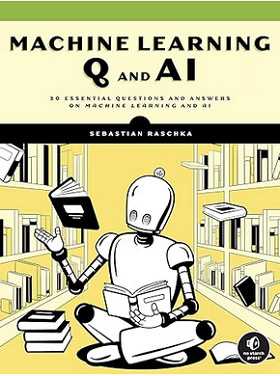| Machine Learning Q and AI (No Starch Press) |
|
Author: Sebastian Raschka This is not a textbook on AI and it isn't in introduction to AI. It is a collection of questions that you might ask about AI and then quite long attempts at answering them. Of course, how successful this is depends very much on you wanting to ask the questions and on being able to understand the answers in isolation. In short, you need to know just enough about AI to have the holes filled in by reading this book. It is comprised of five sections: Neural Networks; Computer Vision; Natural Language Processing; Production and Deployment; and Predictive Performance and Model Evaluation. You can see that the entire book is biased towards the neural network approach to AI, but given the success, and hence importance of this approach, this is not unreasonable. It starts off with a look a some theoretical aspects of AI - latent space and representations in general. This is unfortunate because these are very subtle concepts and the description really don't help untangle the subtle meaning without the reader putting in a lot of work. It almost made me decide that this wasn't a good book but I pressed on and was rewarded with some interesting discussions of less abstract and more practical topics. I was particular interested in the chapter on multi-GPU training procedures as I had never encountered an overview of the topic. The section on computer vision goes over the usual ideas of convolutional networks - you would need to know somethings about the subject to get much from it. The section on Natural language processing isn't about classical approaches to the problem but self attention and transformers which are at the core of the large language models that are so successful - is classical NLP dead? I found the last two sections - production and deployment and model evaluation least interesting because they are not problems I currently have. You might need to know the basics of statistics to get much from the final chapter. |
C# Programming, 3rd Ed (In Easy Steps) Author: Mike McGrath |
Data Structures & Algorithms in Python Author: Dr. John Canning, Alan Broder and Robert Lafore |
| More Reviews |

